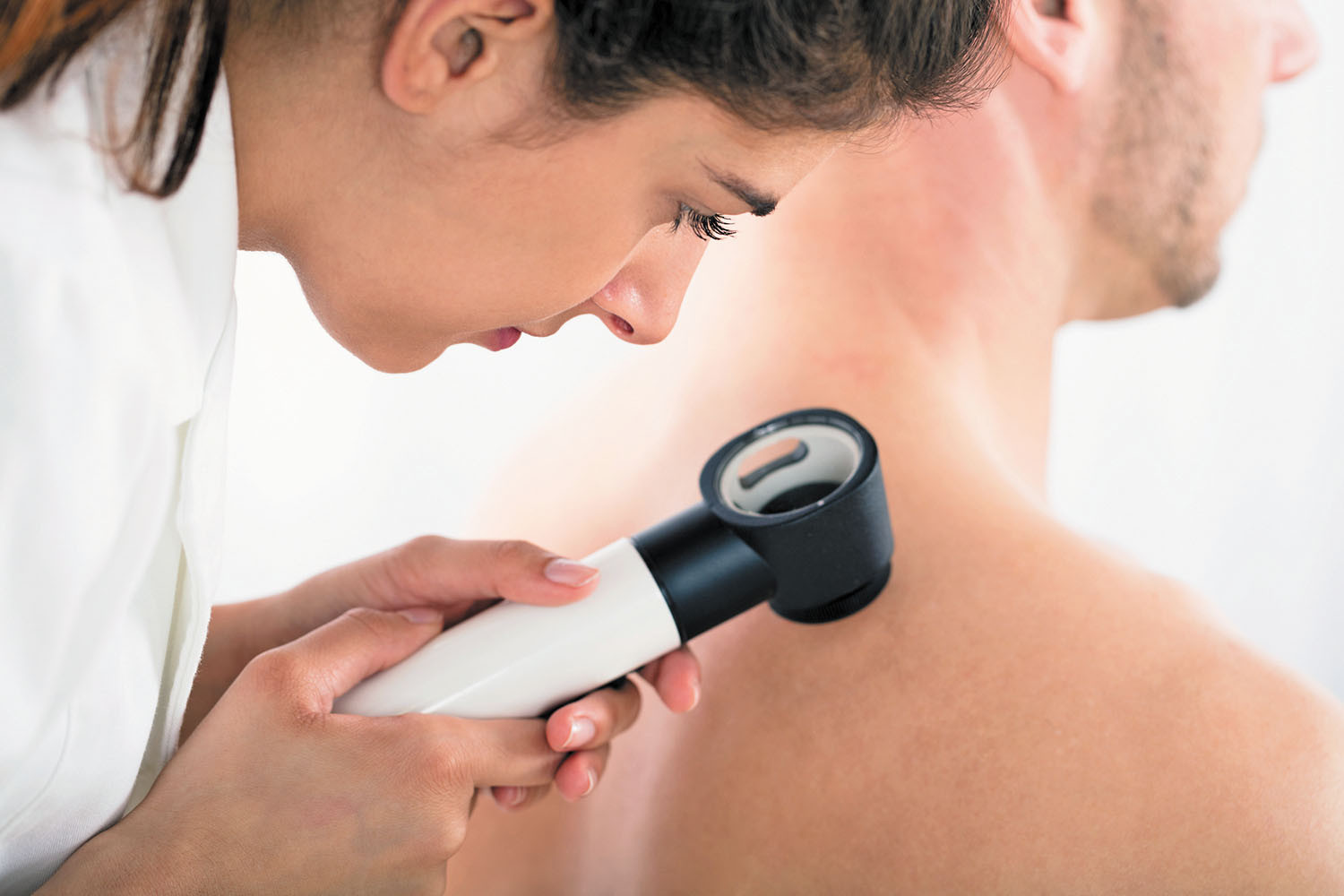
Daily cup of coffee may prevent afib recurrence

Gene-editing therapy lowers harmful blood fats in early study

What is EMDR therapy, and who can it help?

GLP-1 drugs versus bariatric surgery for treating obesity

Trying to lose weight? Be careful not to lose muscle

Two dumbbells, three exercises, and 10 minutes

Easing the emotional burden of IBS

Modify your push-ups to meet your fitness level

What is long QT syndrome?

Stroke survivors may benefit from very low LDL levels
Skin Cancer Archive
Articles
Rhabdomyosarcoma
Sarcomas are a type of cancer that develops from the soft tissues (fleshy parts) of the body, as well as from bone and fatty tissue. This type of cancer is different from carcinomas. Carcinomas develop more frequently in the body's organs, especially those organs that contain glands. Examples of carcinomas include lung cancer, colon cancer, pancreatic cancer, breast cancer, prostate cancer.
Rhabdomyosarcoma is a cancer that forms in the skeletal muscles. Skeletal muscles attach to bones. They help the body move. Most rhabdomyosarcomas occur in children and teenagers.
Soft Tissue Sarcoma
What Is It?
A sarcoma is a cancer that develops from particular tissues, such as muscle or bone. In contrast, most cancers develop from organs that contain glands, such as the breast, colon, prostate and lung, among others.
There are two types of sarcoma: osteosarcoma, which develops from bone, and soft tissue sarcoma. Soft tissue sarcoma can arise from muscle, fat, nerves, cartilage, or blood vessels. Cancerous tumors can develop when abnormal cells in these tissues multiply and grow out of control. Scientists do not yet fully understand why these cells become abnormal. However, most cancers are thought to develop due to genetic changes (mutations).
People know sun protection is important, but often skip it
Research we're watching
While more than three-quarters of Americans say that sun protection is important, less than half actually use it on a regular basis when they're heading outside, according to a survey by the American Academy of Dermatology. Some 28% of those polled said they rarely or never use sun protection, which includes using sunscreen, staying in the shade outside whenever possible, and wearing clothing such as hats or other items that can protect against the sun's rays. Sun exposure is the leading cause of skin cancers, affecting one in every five Americans, so the AAD says it's important that people take steps to protect themselves. The AAD recommends that you
- wear sunscreen with 30 SPF or higher
- stay out of the sun between 10 a.m. and 2 p.m., when its rays are the most intense
- use clothing to protect your skin, such as a hat and long-sleeved shirt.
Image: © Aleksej Sarifulin/Getty Images
On the spot
What does that skin spot or growth mean, and when should you have it checked?
Even if you're diligent about sun protection (and you should be), you can still develop skin spots, growths, or other abnormalities.
But are they always cause for concern, or just a normal part of aging skin?
Daily skin care in 3 simple steps
A widely-advertised facial moisturizer claims to be the best on the market — and sells for $225 per bottle. Should you buy it? Another brand offers a complete skin care regimen — but it comes in 10 different bottles of lotions and potions that all need to be applied daily. Is it worth your time?
Despite manufacturers' claims, many cosmetic products will remove more cash from your wallet than dirt and oils from your skin. You don't need an expensive or lengthy skin care routine — and the good news is, the most effective and reliable regimen is also quick and inexpensive.
Stay ahead of skin cancer
Learn to spot an actinic keratosis before it becomes cancerous.
About 58 million people have at least one actinic keratosis (AK), a precancerous skin growth caused by too much sun exposure.
Yet most people don't see the potential danger in these lesions because they are small, with few if any annoying symptoms, and can go away almost as fast as they appear.
Zinc oxide shows no link to skin damage
In the journals
Zinc oxide (ZO) is one of the most effective ingredients in sunscreen, but previous studies have suggested it could potentially damage skin cells. Now, a small study in the February 2019 Journal of Investigative Dermatology has found that ZO nanoparticles don't penetrate the skin or damage skin on a cellular level even with repeated applications.
ZO is one of 17 active sunscreen ingredients approved by the FDA. ZO offers broad-spectrum protection and shields against both UVB rays, which cause sunburn, and UVA rays, which penetrate more deeply and are more likely to damage cell DNA and increase the risk of skin cancer.
Do all skin cancers have to be removed?
Ask the doctor
Image: © AndreyPopov/Getty Images
Q. My doctor says I have a small skin cancer on my scalp, but it's not melanoma. Do I really need to have it removed?
A. It's true that melanoma is the most dangerous type of skin cancer, because it can spread throughout the body. You definitely need to have any melanoma removed, to try to excise it before it spreads. Two other types of skin cancer, basal cell carcinoma and squamous cell carcinoma, are more common than melanoma. It sounds like you have one of those. They spread only rarely, but they do grow larger. Not only is this disfiguring, but delay in removing them makes it harder to remove them with only a minimal scar. And cancers on the scalp, when they become large, can be particularly hard to remove.
Don't fall for these skin myths
Think you know a lot about skin and skin care? You might be surprised at how much "common knowledge" about keeping your skin clear and healthy is simply not true.
Here, we debunk 10 common myths about skin.
1. The right skin cream can keep your skin looking young.
Sunscreen in a pill?
Research we're watching
The FDA is warning consumers not to buy in to the idea that a pill can protect your skin from the sun.
In a statement issued May 22, FDA officials said they've found companies selling pills that are labeled as dietary supplements and that claim to protect skin from the sun.

Daily cup of coffee may prevent afib recurrence

Gene-editing therapy lowers harmful blood fats in early study

What is EMDR therapy, and who can it help?

GLP-1 drugs versus bariatric surgery for treating obesity

Trying to lose weight? Be careful not to lose muscle

Two dumbbells, three exercises, and 10 minutes

Easing the emotional burden of IBS

Modify your push-ups to meet your fitness level

What is long QT syndrome?

Stroke survivors may benefit from very low LDL levels
Free Healthbeat Signup
Get the latest in health news delivered to your inbox!
Sign Up










